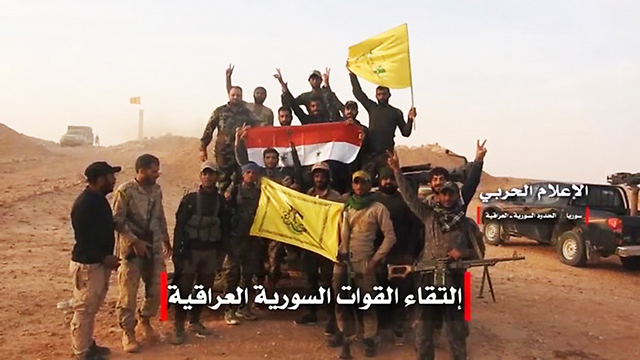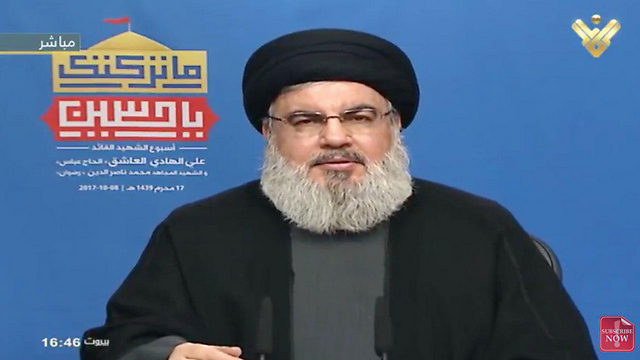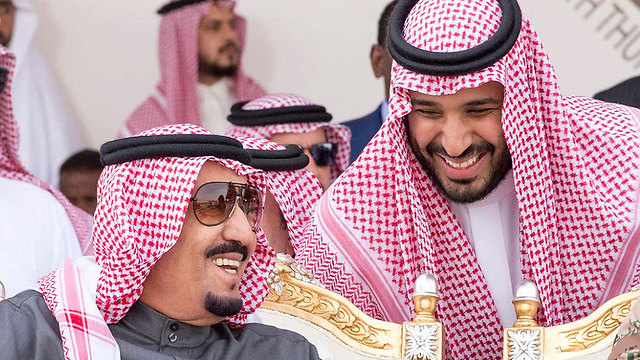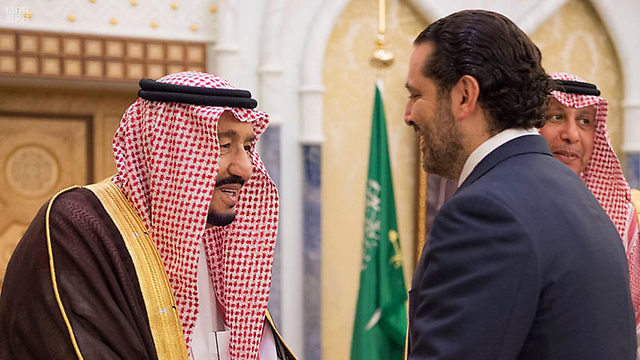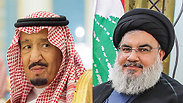
Why is Saudi Arabia so determined to destroy Hezbollah?
Analysis: The strongest Arab country today is leading the Sunni battle against an Iranian takeover of the Middle East. Once the ‘black monster’ ISIS disappears from the region, the ‘yellow monster’ Hezbollah will become the largest and most dangerous Islamic terror organization in the world, receiving orders from Tehran—and this is something the Saudis are unwilling to accept.
A red line was crossed last week, as far as the Saudis are concerned, when Houthi rebels in Yemen fired a missile at Saudi Arabia’s capital, Riyadh. What does Hezbollah have to do with the Houthis? Lebanon and Saudi Arabia don’t share a border, and the Shiite organization is threatening Israel, not the Saudi kingdom. So why is Saudi Arabia so determined to destroy the Lebanese organization?
Hezbollah is everywhere in Syria
If we thought Hezbollah was deployed primarily in western Syria to defend Lebanon’s border, images released Thursday morning reveal the true story behind the war in Syria: The al-Mayadeen newspaper published “joyful” photos of Iraqi and Syrian fighters meeting on the border between the two countries after conquering the town of al-Bukamal in the Deir al-Zour Governorate. The article’s title, “Restoring the borders to their pre-ISIS condition” is misleading. That’s not the case at all.
The fighters in the picture are not soldiers in the Syrian and Iraqi armies. They are waving flags of Hezbollah and Shiite organization al-Hashd al-Shaabi (the Popular Mobilization Forces). In other words, the fighters meeting and celebrating the “victory” are actually two Iranian-controlled militias.
This is the reality the Arab Sunni world is dealing with right now. The Sunni battle against the Iranian takeover of the Middle East is being led by the Saudi kingdom, which is the strongest Arab country today both economically and militarily.
Hezbollah in Yemen
About a year and a half ago, Saudi Arabia declared war on the Iranian-backed Shiite Houthis in Yemen, following their attempt to take over the country. Saudi Arabia claims it is protecting ships passing through Yemen’s ports in a bid to prevent Iran from controlling 10 percent of global trade passing through the port city of Aden and the Bab-el-Mandeb strait.
About a year ago, Saudi and Qatari sources revealed (before their conflict with Saudi Arabia) that Hezbollah was not only offering the Houthis in Yemen ideological and communicational support, but was also helping them with advice and training from Hezbollah fighters.
Several days ago, the Houthis demonstrated the increase in their missile range by firing a missile at the Saudi capital of Riyadh. About a year ago, the Houthis fired a missile at Islam’s holiest site, Mecca. In the video documenting the attack on Riyadh, the launchers are heard chanting the Houthi slogan: “Death to the Jews, victory to Islam.”
Hezbollah’s ties with the Houthis are tactical, religious and ideological. They are both satellites of Iran and they cooperate. According to Saudi Arabia, Hezbollah is also cooperating with Iraqi organization al-Hashd al-Shaabi and with other subversive Shiite organizations in the Arab world, like the Shiite opposition in Bahrain (a Sunni pro-Saudi country where the Shiites make up 60 percent of the population).
The Saudis aren’t interested in the threat Israel is facing from Hezbollah. The Saudi hostility towards the Shiite organization has to do with the fear of a Hezbollah's expansion in the Syrian-Lebanon domain.
In 2015, the Syrian regime was on the verge of collapse thanks to the Saudi and Qatari support for the Sunni opposition organizations, but the Russian intervention that year turned the tables. After the elimination of the moderate rebels and the al-Nusra Front in western Syria, and the significant shrinkage of the Islamic State (ISIS) in eastern Syria, the created void is being filled by Bashar Assad’s army, supporters of the Syrian regime, but also Iran’s Shiite militias that are helping the Assad regime, led by Hezbollah.
The arena Israel is most concerned about is the Golan Heights, where the Iranians are making an effort to recruit the Druze and the Christians as well (for example, the cells of Mughniyah and Kuntar, who were assassinated in recent years). The Saudis, however, are more concerned about the larger picture of the organization’s takeover of the entire region.
Hariri is telling the difficult truth
Lebanese Prime Minister Saad al-Hariri’s resignation announcement last Saturday, during a visit to Saudi Arabia, took the Lebanese people by surprise. What they were mostly surprised about was Hariri’s public declaration, in which he said everything the Lebanese are thinking but are afraid to say: Hezbollah controls Lebanon, and the prime minister and parliament’s roles are empty. In other words, Lebanon is a country under Iranian occupation.
Hariri, like his Druze colleague, Walid Jumblatt, held the feelings of insult inside of him for many years. He was forced to shake the hands of Hezbollah men, stained with the blood of his father, slain Lebanese Prime Minister Rafik Hariri, in order to survive and regain the premiership. Jumblatt was forced to travel to Damascus several decades ago and shake hands with former Syrian President Hafez Assad, who murdered his father Kamal Jumblatt, in order to protect the status of the Druze community in Lebanon.
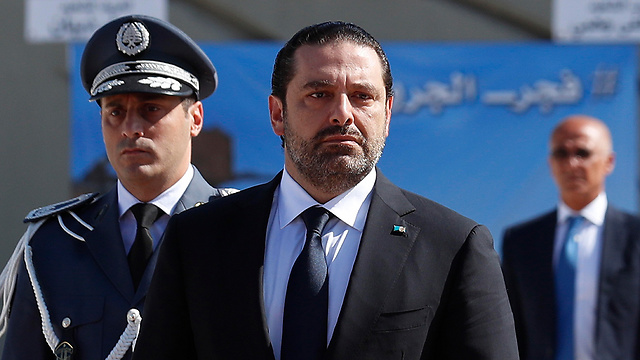
Most Arab commentators believe that the timing of Hariri’s resignation has to do with information the Lebanese prime minister received in Saudi Arabia—not just about the kingdom’s support for him and for the Sunnis in Lebanon, but also about anti-Hezbollah activities Saudi Arabia is planning to execute in the near future.
Will Hamas become Gaza’s Hezbollah?
It’s no coincidence that Palestinian President Mahmoud Abbas left for Saudi Arabia immediately after the resigning Lebanese prime minister’s visit. Abbas likely went there to receive economic aid from Saudi Arabia and discuss the danger of Hamas turning into “the Palestinians' Hezbollah.”
Hamas has recently drawn closer to Iran, and the option of Iranian aid to the Palestinian organization has been reconsidered. The Saudis are concerned about this relationship, as Hamas could turn into another Iranian wing on the border of Riyadh’s ally, Egypt. The same slogan is now being heard from both Hezbollah and Hamas: “The makauma (resistance) weapon must not be touched.”
In Lebanon, there is no one who would dare try to collect Hezbollah’s weapons. The Palestinian reconciliation will also come to an end once Fatah tries to collect Hamas’ weapons.
Drums of war are already sounding
The black monster, ISIS, is about to disappear from the map, and Saudi Arabia and its allies are now preparing the war against the yellow monster—Hezbollah. After the Islamic State’s disappearance, Hezbollah will stand out as the largest and most dangerous Islamic terror organization in the world.
Saudi Arabia will find it easier to enlist the United States in the Trump era, as the American president is determined to fight Iran. The US has a score to settle with the Shiite organization. Both the US and France haven’t forgotten the 1983 Hezbollah attack on American Marines in Beirut, which left 241 American soldiers and 58 French soldiers dead.
Any threat to Hariri’s life after his return to Lebanon could lead to a regional explosion. His father’s murder in 2005 led to international pressure on Syria and to its army’s withdrawal from Lebanon that same year, as well as to the murder investigation which led to Hezbollah operatives. Are commentators in the Sunni world right to predict that Lebanon will soon find itself in a stat of war?
Anti-Hezbollah coalition? Not in the near future
Thamer al-Sabhan, the Saudi minister for Gulf affairs, raised an idea two weeks ago to form a coalition against Hezbollah, like the coalition against the Houthis and against ISIS. This is a convenient timing, as Hezbollah is still up to its neck in the war in Syria and will have to fight on a few fronts. The idea is likely being tossed around in conversations between Saudi Arabia, the US and the axis of moderate Sunni states.
Geographically, Lebanon is surrounded by Syria from all directions apart from the south, which borders on Israel. As some of the countries expected to be part of the coalition have no diplomatic ties with Israel, they would likely favor an attack from the sea. But that is not only a complicated and difficult operation, it might also encounter Russian opposition. Furthermore, Israel would pay most of the bloody price of such a war, as Hezbollah would likely respond with massive fire on Israel.
Nasrallah, who is supposedly assuming the role of the “responsible adult,” has announced in the media that the Lebanese have nothing to worry about and that peace (in other words, a continuation of the Iranian occupation) will be maintained in Lebanon. Peace will be maintained, but not thanks to Nasrallah. Lebanon survived the Arab Spring because the thing that scares the Lebanese people more than anything else is a civil war (after two civil wars the country went through in the past).
An external threat is nowhere in sight either, in light of Egyptian President Abdel Fattah al-Sisi’s comment last week that he is against a war in Lebanon. Egypt is supposed to be Saudi Arabia’s main partner in the anti-Hezbollah coalition. So until the coalition is formed, the Saudis will have to settle for the traditional war they excel in—the economic battle.
Dr. Yaron Friedman, Ynet's commentator on the Arab world, is a graduate of the Sorbonne. He teaches Arabic and lectures about Islam at the Technion, at Beit Hagefen, and at the Galilee Academic College. His book, "The Nusayri Alawis: An Introduction to the Religion, History and Identity of the Leading Minority in Syria," was published in 2010 by Brill-Leiden.










